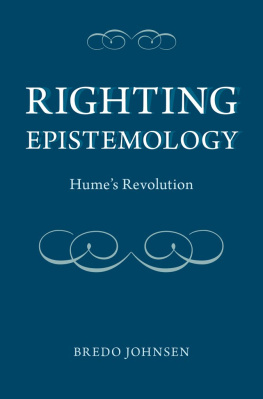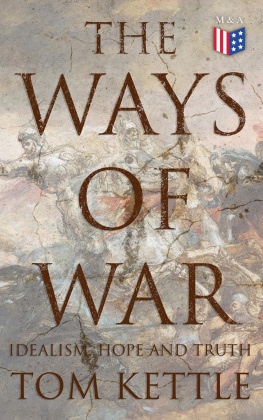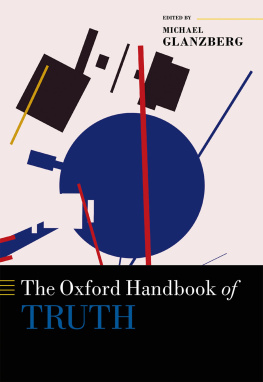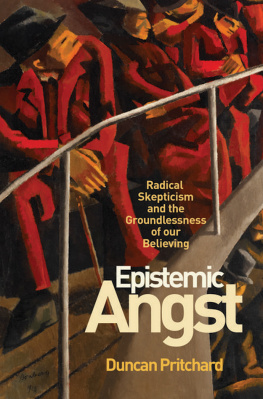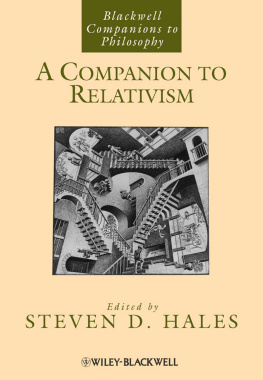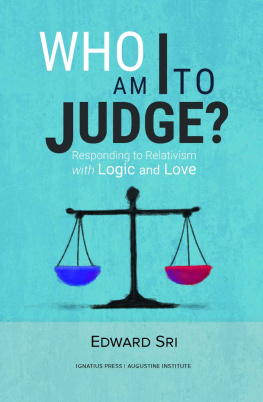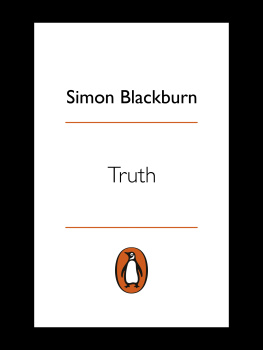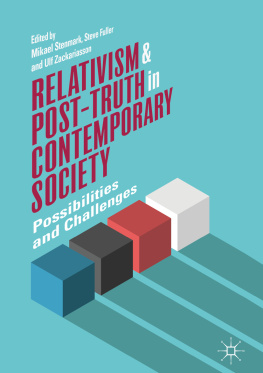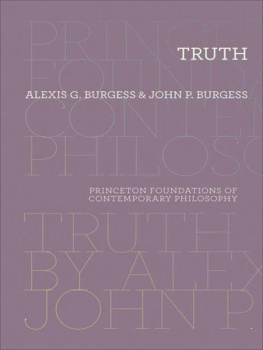Truth and Skepticism
Truth and Skepticism
Robert Almeder
Published by Rowman & Littlefield Publishers, Inc.
A wholly owned subsidiary of The Rowman & Littlefield Publishing Group, Inc.
4501 Forbes Boulevard, Suite 200, Lanham, Maryland 20706
http://www.rowmanlittlefield.com
Estover Road, Plymouth PL6 7PY, United Kingdom
Copyright 2010 by Rowman & Littlefield Publishers, Inc.
All rights reserved. No part of this book may be reproduced in any form or by any electronic or mechanical means, including information storage and retrieval systems, without written permission from the publisher, except by a reviewer who may quote passages in a review.
British Library Cataloguing in Publication Information Available
Library of Congress Cataloging-in-Publication Data
Almeder, Robert F.
Truth and skepticism / Robert Almeder.
p. cm.
Includes bibliographical references and index.
ISBN 978-1-4422-0513-0 (cloth : alk. paper) ISBN 978-1-4422-0514-7 (electronic)
1. Truth. 2. Skepticism. I. Title.
BD171.A415 2010
121dc22
2010009091
` The paper used in this publication meets the minimum requirements of American National Standard for Information SciencesPermanence of Paper
for Printed Library Materials, ANSI/NISO Z39.48-1992.
Printed in the United States of America
This book is dedicated to Melanie Mary Almeder whose quick wit and good humor so often lights up our lives, providing us with abundant joy and gratitude for her loving presence.
Preface
My thanks to those who read various sections of this book and who offered helpful comments. They gave generously of their time and criticism. Sometimes those comments came in the form of a crisp sentence or two but, nevertheless, inspired substantial rewriting on my part. Sometimes the comments were anything but supportive but preeminently worthy of a careful response. Sometimes they were simply observations made over a noisy dinner at the annual Rutgers Epistemology Conference. Apart from the fact that I am sure to miss mentioning someones insightful assistance, I am especially grateful to Ernie Sosa, Robert Nozick, Crispin Wright, John Mackie, Simon Blackburn, Nick Rescher, Richard Gale, Paul Humphreys, Bill Lycan, Paul Horwich, Pascal Engel, Michael Pendlebury, Peter Klein, Richard Kirkham, Barry Smith, Steven Rieber, David Blumenfeld, Gerald Vision, and Steve Jacobson. My graduate students in epistemology at Georgia State University, the students and faculty in the graduate philosophy seminars and other conferences at the Universities of Pittsburgh, Paris IV (The Sorbonne), Witwatersrand, Tel Aviv, and the National Research Center (CNRS) in Paris all contributed to the effort and to whatever insight I was fortunate enough to bring to the project. Finally, I would like to thank the Department of Philosophy at Hamilton College for providing me with the Allan McCullough Chair, the wonderful home, colleagues, and students from 20042006 when I worked on this manuscript. Finally, my dear daughter Melanie read and helped by making several insightful corrections in content and style.
Robert Almeder
Spring 2010
I
Rejecting Correspondence and All Non-Epistemic Conceptions of Truth
I have been presenting the realist conception of truth as if it were an important, exciting, and controversial philosophical position. But, you may suppose, it is nothing but a miserable truism that no one in his right mind would deny. What could be more obvious than that it is true that there are books in my study if and only if there are books in my study? Whats all the fuss about? Well, it does seem to me an obvious truism that this is the way to think about the truth. But nonetheless it has been frequently and enthusiastically denied, especially in recent times.
William Alston, A Realist Conception of Truth
Putnams thesis is incredible. We are in the presence of a paradox, as surely as when we meet the man who offers us a proof that there are no people, and in particular that he himself does not exist. It is out of the question to follow the argument where it leads. We know in advance that there is something wrong, and the challenge is to find out where. If the paradox monger is good at his work, we stand to learn something; and indeed, I think Putnams paradox affords an important lesson.
David Lewis, Putnams Paradox
1. Introduction: Perfect Knowledge,
Imperfect Knowledge, and Truth
Rudolf Carnap gave us two concepts of knowledge. The first he called perfect knowledge and defined it in terms of un-revisably true beliefs about the world. The second he called imperfect knowledge and characterized it as revisable beliefs robustly confirmed or confirmable under the method(s) of the natural sciences. He also asserted that, because human knowledge about this world is only a matter of ones having a very high probability of truth, there is no perfect knowledge. So the concept of perfect knowledge is vacuous. There is only imperfect knowledge about this world. Moreover, for Carnap, we cannot assume that when one has imperfect knowledge one has actually attained truth, at least as we commonly conceive of it alethically, non-epistemically, or in terms of correspondence. At best, we can only suppose that, on the evidence available, one has attained merely a high probability of truth, and beliefs that are highly probable are sometimes false. In short, for Carnap, as we ordinarily understand it, truth is not a necessary condition for knowledge about this world. Rather it is something to which knowledge aspires, but never certifiably reaches.
But some philosophers urge that Carnaps conception of imperfect knowledge is an imperfect conception of knowledge. They think Carnaps imperfect knowledge amounts to no knowledge at all, when in fact we know much about the world. Robustly confirmed belief without truth as a necessary condition, they say, is not knowledge at all because real knowledge obviously requires truth commonly understood in terms of beliefs and assertions that succeed in telling us exactly how the world is quite independently of how we or anybody else might like it to be. Otherwise, human knowledge could not tell us anything in particular about this world rather than about the way we regard it at our epistemological best, that is to say, when our beliefs about it are highly probable, revisable, and therefore not necessarily true.
And yet, inspired by Carnap and other fallibilists, we can find persuasive reasons to abandon our common conception of truth and settle instead for some suitably characterized epistemic conception explicated in terms of robust confirmability or fully warranted assertibility. For instance, we have good inductive evidence that truth, understood alethically or in terms of correspondence, is never demonstrably shown to be a property in any particular claim about a world where our highest epistemological aspirations can only be to attaining evidence rendering our beliefs very likely to be true on all available evidence. Again, as we shall see, from the fact that ones belief is highly likely to be true on all available and accessible evidence, it never follows that ones belief is true. In such a world, if truth is a necessary condition for knowledge, how could we ever show that the truth condition has been satisfied, rather than quite probably satisfied, in any particular belief or assertion? Failing that, how could we establish that anybody knew anything at all? Moreover, if the most we can attain is merely the high probability of truth, the fact that many past empirical beliefs judged very likely to be true turned out subsequently not true at all seems reasonably solid inductive evidence that scientific realism is false and instrumentalism true, because at no time could we be sufficiently assured that any particular highly confirmed theoretical belief would not go the way of phlogiston or Ptolemys geocentric hypothesis. In short, classical realists and nonskeptics need to attain something stronger than the high probability of truth when, according to Carnap and all other advocates of imperfect knowledge, there is nothing stronger available to us. Consequently, for these reasons we seem to have the unenviable choice between keeping the correspondence or non-epistemic theory of truth or abandoning it for an epistemic theory with the disturbing implication that, however we choose, blinding skepticism is our dark destiny. Nor are we apparently able to avoid making the choice once we eliminate deflationary or elimination (redundancy) theories of truth in favor of more substantive or robust theories. Or so it appears.


